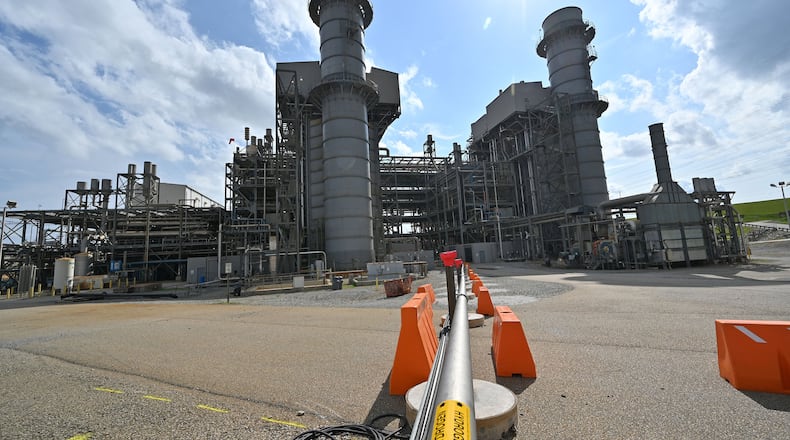Georgia utility regulators voted Tuesday to “certify” the cost to construct three new oil and gas-burning units Georgia Power says are needed to meet a wave of electricity demand — mostly it says from energy-hungry data centers — paving the way for the company to charge ratepayers for the project in the future.
The five members of the Georgia Public Service Commission (PSC), all Republicans, voted unanimously to approve the cost of the new units, which are set to be built at Plant Yates in Coweta County, 45 miles southwest of downtown Atlanta.
The PSC already gave the company a green light to skip the normal competitive bidding process to expand the plant, but did not sign off on Georgia Power’s estimated capital and construction costs for the project or procedures for monitoring progress. Tuesday’s vote sets a cap for the costs Georgia Power’s customers are likely to be charged for down the line.
Though Georgia Power refused to disclose the price tag, arguing the information is “trade secret,” an analysis comparing the cost of building oil and gas units in other states submitted by the PSC’s staff reveals the cost of the new Yates turbines is likely to approach or exceed $1 billion.
For costs above the amount the PSC certified Tuesday, Georgia Power will have to show that any overruns are the result of “circumstances beyond the company’s reasonable control,” like hurricanes, pandemics, labor strikes, “acts of God” and more. If any such costs are incurred, the company will still have to prove to the commission that they were “reasonable and prudent.”
How much rates will go up to pay for the project is yet to be determined and will be up to the PSC to decide at a to-be-determined later date.
But the new Plant Yates costs will only add to a series of rate hikes and construction costs passed along to Georgia Power customers in recent years, including billions in cost overruns for the new nuclear units at Plant Vogtle.
The new Yates units are so-called “peaker plants,” which are generally only fired up at times of peak demand, and will be able to generate electricity by burning either gas or low-sulphur diesel.
They will join two existing units at the site, which were converted to gas after decades of burning coal. All of Plant Yates’ other coal-burning units were shuttered in 2015.
Running on natural gas, the three units combined will have a maximum output of about 1,300 megawatts. Powered by diesel, their capacity drops to 1,070 megawatts, which is comparable to one of the recently completed nuclear units at Plant Vogtle.
Credit: TNS
Credit: TNS
Critics have disputed the urgency of the company’s purported need to generate more electricity, but Georgia Power argued in hearings the influx of data centers and other facilities is happening so quickly it needs to build the units itself, rather than solicit outside bids.
“Simply put, we need to build these units and we need to build them now,” Steve Hewitson, an attorney representing Georgia Power, told the PSC last week.
Environmental advocates pushed unsuccessfully for the commission to delay its vote until after the company and the PSC have evaluated whether the open market could provide cheaper options for supplying the electrons.
After 14-straight months of record high global temperatures, opponents also argued allowing Georgia Power to burn more fossil fuels would exacerbate global warming and further expose customers to swings in fuel prices.
Since Georgia Power is not allowed to earn profits on fuel expenses, utility regulators have typically allowed those costs to be passed on to customers with little adjustment.
“This places an enormous risk squarely on the back of customers … “ Curt Thompson, an attorney representing the Sierra Club and the Southern Alliance for Clean Energy, told the PSC in hearings last week.
As part of the agreement approved Tuesday, Georgia Power will also have to file semiannual reports with the PSC to monitor its construction progress.
The company submitted similar updates on the expansion of Plant Vogtle, but that project was still plagued by years of delays and more than $20 billion in cost overruns, which have led to skyrocketing rates for customers.
Georgia Power has promised the Yates construction will be a different story.
“We are absolutely expecting to bring this in on time, on budget and bring it into service for our customers,” Jeffrey Grubb, Georgia Power’s director of resource and policy planning, testified at a July hearing.
A note of disclosure
This coverage is supported by a partnership with Green South Foundation and Journalism Funding Partners. You can learn more and support our climate reporting by donating at ajc.com/donate/climate/
About the Author
Keep Reading
The Latest
Featured





